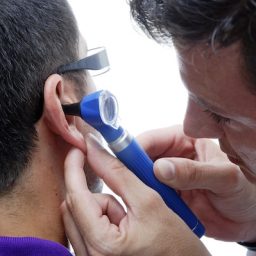Your ears are more than simply handle vessels for collecting and funneling sounds to the brain.
They make excellent eyeglass supports!
AND they can tell you a lot about your health if you know what signs to look for.
Pretty impressive, huh?
Ears Provide Clues About Your Physical Health
Your Albany audiologist says a cursory glance at, or inside, your ears can provide surprisingly detailed information about underlying health conditions you might not even be aware of.
Look for any of the following signs, which might signal the need to visit a specialist for a more thorough examination.
- Creased earlobes. Earlobes that contain a diagonal crease across the middle may be a sign of coronary heart disease. This has been dubbed Frank’s sign and occurs when tissue that surrounds the blood vessels breaks down around the ears and heart. There’s no need to panic if you spot a creased earlobe – sometimes, just sleeping funny can produce this effect – but if you are experiencing chest pain or shortness of breath, make an appointment with your doctor.
- Hearing loss. Many different physical, social and psychological health conditions are associated with hearing loss, including dementia, diabetes and kidney disease. Johns Hopkins University researchers have found that individuals with moderate hearing loss are 3x more likely to suffer from dementia as individuals with normal hearing.
- Single-sided deafness. Sometimes referred to as SSHL, hearing loss that affects only one ear may be the result of trauma, infection or fluid buildup. It can also occur as a result of a benign tumor known as an acoustic neuroma. When this tumor grows large enough to push against the auditory nerve, it can cause a hearing loss in one ear. Look for other symptoms such as dizziness, ringing in the ears and facial drooping.
- Tinnitus. This ringing (or hissing/roaring/whooshing/buzzing/etc.) in the ears is a symptom of an underlying health condition. There are many different diseases and disorders that can cause tinnitus; these include high blood pressure, cardiovascular disease, hormonal changes, Meniere’s disease and tumors. Tinnitus can also cause stress, anxiety and insomnia.
- Itchy ears. Itchy ears might indicate the presence of eczema or fungus. The latter condition is often accompanied by a white discharge, while white flakes and a red ear canal might be present with the former. Do not scratch your ears; this increases your odds of infection. Any itchiness that persists more than a couple of days should be evaluated by a doctor.
- Earache. Adult earaches are rare and might be a type of “referred pain” that accompanies a toothache, TMJ disorder, cellulitis from an infection, sore throat or tumor. Earaches should be evaluated by a hearing professional, especially if you are experiencing any of these other symptoms.
- Wet, sticky earwax. Some earwax is normal and beneficial; it helps prevent bacteria and other particles from entering the ear canals. But earwax with a wet and sticky texture is NOT normal and might be a sign of a mutation on the ABCC11 gene, which can increase your chances of developing breast cancer. Earwax with an unusual consistency should prompt a visit to an audiologist, especially if there is a family history of breast cancer.
- Red ears. Exposure to the sun or flushing from embarrassment often cause the ears to turn red. This may also occur due to hormonal changes associated with menopause or Red Ear Syndrome, a condition characterized by a burning sensation in the ears that may produce migraines and cluster headaches.
- Numbness. Ear numbness is a possible sign of stroke, especially if symptom such as facial drooping, limb weakness and difficulty speaking are also being experienced. If the numbness is accompanied by vertigo, hearing loss or tinnitus, you might be suffering from Meniere’s disease, a disorder of the inner ear. If you experience numbness along with a tingling sensation that extends to other extremities, you might have peripheral neuropathy – a common side effect of diabetes.
- Structural abnormalities and skin tags. Ears that are shaped oddly and have a lot of skin tags – small, fleshy growths – may indicate the presence of kidney disease.
Often, these symptoms are harmless.
But if you are concerned about any of the above, contact an Albany audiologist for further evaluation.
Related Ear, Nose & Throat Posts:
Our Albany and Clifton Park Audiologist Office Locations
Albany
123 Everett Rd
Albany, NY 12205
(518) 701-2085
Clifton Park
1785 Route 9, Suite 201
Clifton Park, NY 12065
(518) 701-2075
